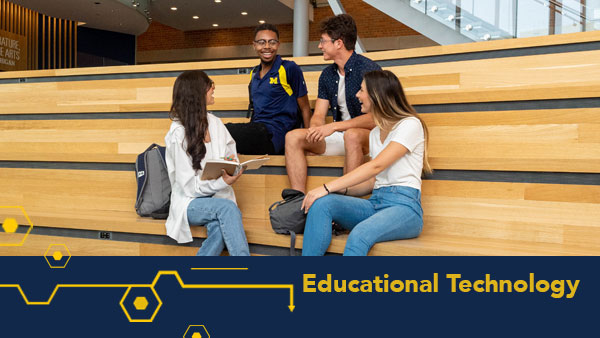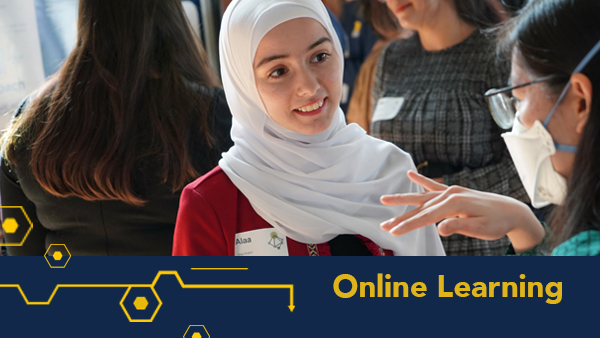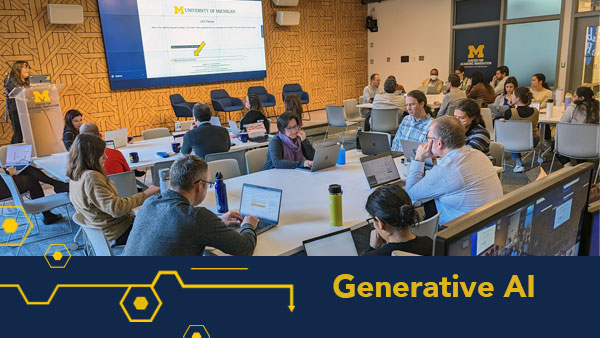Kathryn Gabriele, Doctoral Student in Educational Studies in the School of Education and Leading Educational Innovation and Improvement MicroMasters 2018 Winter Cohort Learner
Hélène Gosset, Leading Educational Innovation and Improvement MicroMasters 2018 Winter Cohort Learner
This is the third in a series of blog posts from the 2018 Winter Cohort of the University of Michigan’s Leading Educational Innovation and Improvement MicroMasters program. In this blog post, we hear from members of the 2018 Winter Cohort about their approaches to self-organizing in an online course that places high emphasis on social engagement to help enable the learning of all participants.
Whether collaborating on team activities in a university-based course or engaging in work groups in a professional context, collaborative work presents a dilemma. On the one hand, it creates the potential to learn and do more than would be possible by working alone, in isolation. On the other hand, it requires managing a long list of challenges, including meeting logistics, interpersonal dynamics, joint work on shared products, and more. These potentials and pitfalls can increase with the diversity of work groups, the geographic distribution of members, competing work demands on members, and the complexity of the work at hand.
These challenges of socially-engaged learning carry into massive open online courses. Research findings suggest some of the greatest payoffs for online learners lie in the opportunity to collaborate with other learners in authentic, project-based learning opportunities. However, many learners value working in the online space precisely because it affords them the opportunity to work individually, and around the contours of their professional and personal lives to engage when-and-as they see fit.
The Leading Educational Innovation and Improvement MicroMasters program uses an instructional design called “Self-Directed/Community-Supported Learning” that challenges participants to manage the payoffs and pitfalls of socially-engaging online learning in team practice exercises, small group and large group discussions, and celebrating success.
The challenge begins immediately, in the first lesson. As a learner who created a team, I (Kathryn) was both excited and uncertain about who would join. After all, in reading the personal introductions of other members of the 2018 Winter Cohort, I realized I would be working with colleagues from across the United States and around the world, some of whom are just starting their educational careers and others who are seasoned professionals.
As members of the 2018 Winter Cohort joined my team, I was overwhelmed by their experience and diversity: a former principal in France now preparing for a leadership position in Québec, an experienced Michigan educator, a University of North Carolina PhD student, a state-level educational professional from Uruguay, and a University of Michigan master’s student.
As someone new to online learning, I was relieved to discover one of my new teammates, Hélène, had completed an online master’s program. Interested in learning more about her experiences and about any advice she might have for the team, I asked her to share the “Top Takeaways” about socially-engaging learning from other online courses.
Here is Hélène’s advice on leveraging the potential (and avoiding the pitfalls) of socially-engaging online learning:
1. Relationship Building Takes Time: Be Open and Patient
Learning to work together takes time. It is possible you won’t really start learning from others until after a few collaborative sessions, so don’t change groups too soon. Take time to learn from others. Form relationships with members of the group. It’s a good way to stay motivated to complete MOOCs.
But, what if I don’t get along with members of my group? This happens, but before changing, check to see if the team has worked together to set norms and rules to guide the group. These are helpful for coordinating team efforts. After several collaborative sessions, if your current team is still a challenge, make a change. Just remember: the perfect group doesn’t exist!
2. Thoughtful, Respectful Communication is Key
Communication is very important in online learning. You often don’t have set times to meet when working asynchronously.Instead, you may have to create them using tools like chat platforms, email, video-conference conference technology, etc. Even if you feel you don’t have much to say, maintain a presence and show interest in what others are writing. This is especially important in your small team.
Understand some people need time to feel at ease and share ideas. So, help engage others who may not initially be quick to respond. Reach out! Ask questions about their thoughts on a precise topic.
3. Be Planful, but Adaptable
Planning and respecting the plan is fundamental to online team work. All learners are working on different timelines. Some work during the day, others at night, others on weekends. Often learners have a full-time job. Planning ahead is necessary for success. Nonetheless, a member of your team may get behind or withdraw from the course. Be prepared by always having an understanding of what others are working on and potential ways to adjust if necessary. Life happens, and sometimes teams need to rearrange how work is shared with little notice.
4. Be Open-Minded, but Earnest
Students from all over the world and from very different backgrounds enroll in MOOCs, so social codes and ways of proposing ideas can vary greatly. A team member may propose an idea with which you may disagree and/or lack comfort. Accept the expression of this idea, and be earnest and explain why you are not comfortable with it. Sometimes the fact that we write instead of talk can lead to misunderstanding and/or contribute to reasons for disagreement. When expressing an idea orally, we can share ideas and ask clarifying questions. It might be a good idea to schedule a video-conference with your team to try to talk through brainstorming sessions and any potential areas of disagreement.
As our team worked together in Leading Educational Innovation and Improvement, we found Hélène’s insights were helpful in guiding our collaboration. Heeding her advice allowed us to form strong, collegial relationships. While we did face the inevitable, initial challenge of self-organizing and delegating tasks in the absence of face-to-face conversation, following her “Top Takeaways” has helped us to successfully jump that hurdle and continue to move, as a team, closer to the finish line.


